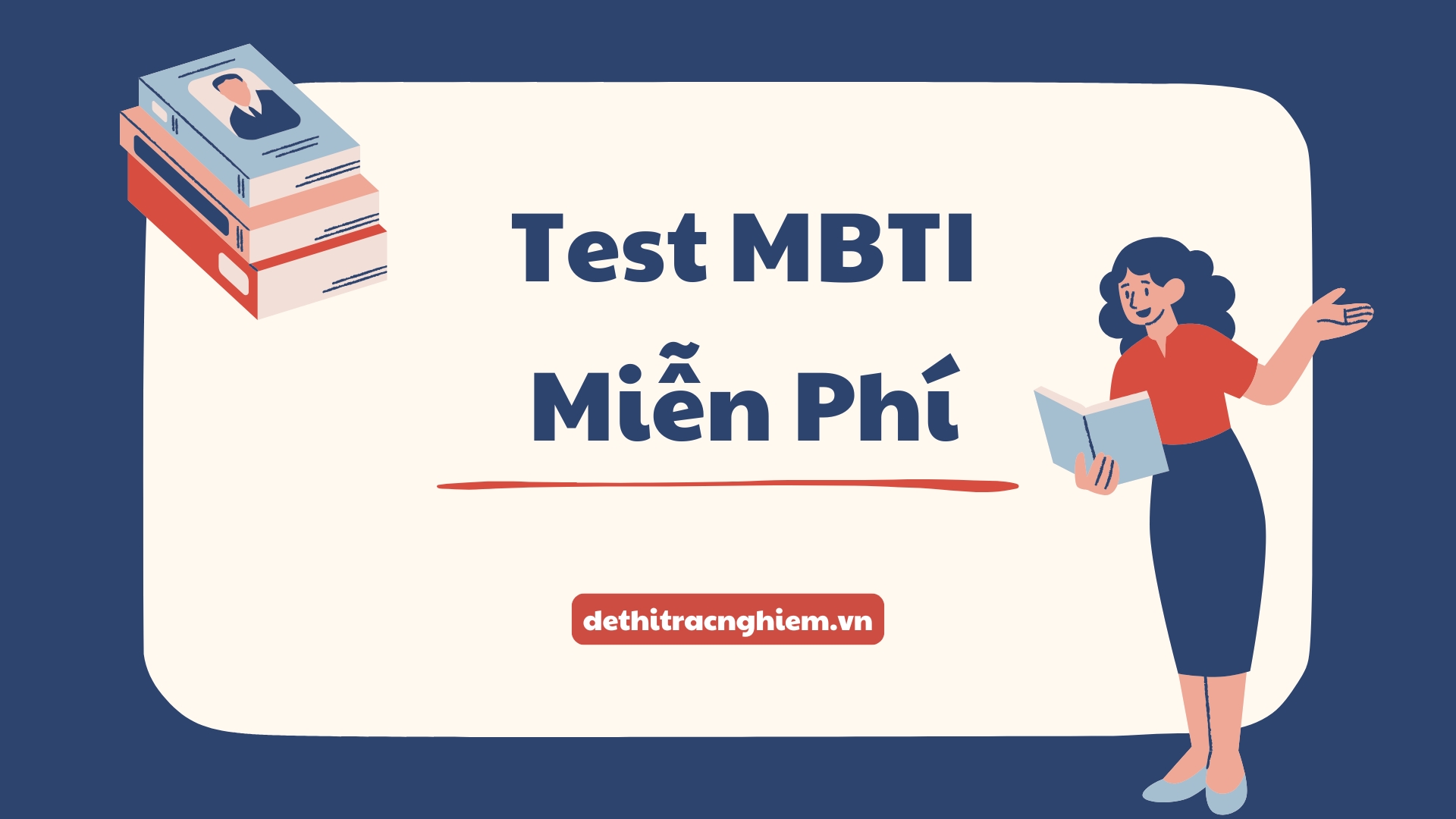Đề thi thử Đại học 2025 môn Tiếng Anh – Sở GD&ĐT Vĩnh Phúc (Mã đề 903) là một trong những đề tiêu biểu thuộc Tổng hợp đề thi thử môn Tiếng Anh THPT QG, nằm trong chương trình Đề thi vào Đại học. Đây là đề thi được xây dựng sát với định hướng ra đề mới nhất của Bộ GD&ĐT, phù hợp với cấu trúc đề thi tốt nghiệp THPT môn Tiếng Anh năm 2025.
Đề thi này bao gồm đầy đủ các dạng bài quan trọng như: phát âm – trọng âm, ngữ pháp cơ bản và nâng cao, từ vựng theo chủ đề, đọc hiểu, điền từ vào đoạn văn (cloze test) và viết lại câu (sentence transformation). Đặc biệt, phần đọc hiểu và phân tích ngữ cảnh trong đề mang tính phân loại cao, đòi hỏi học sinh không chỉ nắm chắc kiến thức ngôn ngữ mà còn phải có khả năng suy luận, tổng hợp và quản lý thời gian tốt trong quá trình làm bài.
Hãy cùng Dethitracnghiem.vn khám phá ngay đề thi thử này và bắt tay vào luyện tập để sẵn sàng cho kỳ thi THPT Quốc gia sắp tới!
- Số trang: 4 trang
- Hình thức: Trắc nghiệm
- Thời gian làm bài: 50 phút (không kể thời gian phát đề)
ĐỀ THI THỬ ĐẠI HỌC MÔN TIẾNG ANH NĂM 2025 SỞ GD&ĐT VĨNH PHÚC ( MÃ ĐỀ 903)
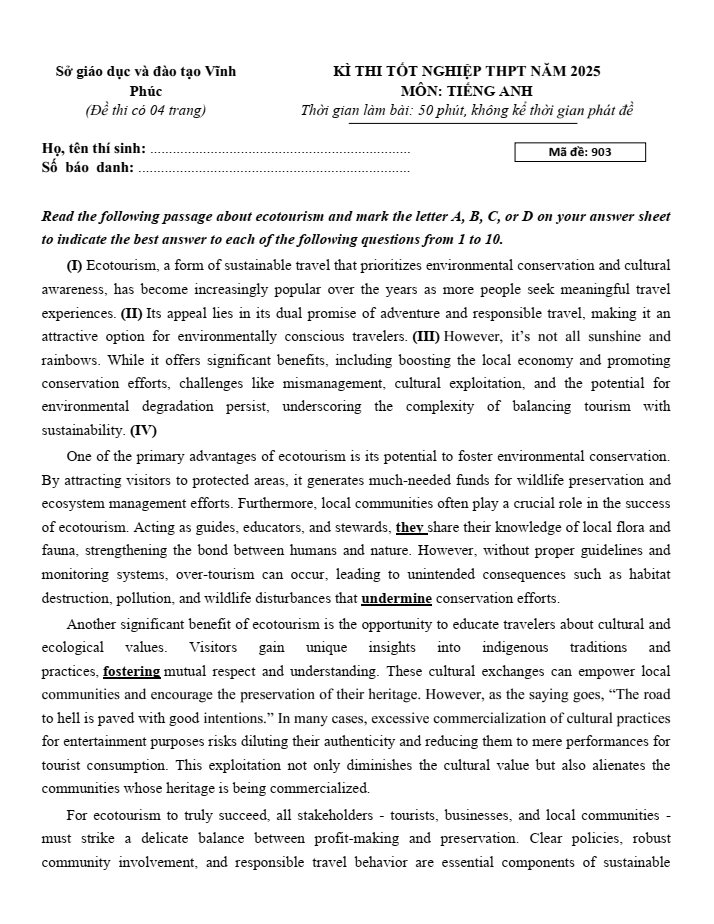
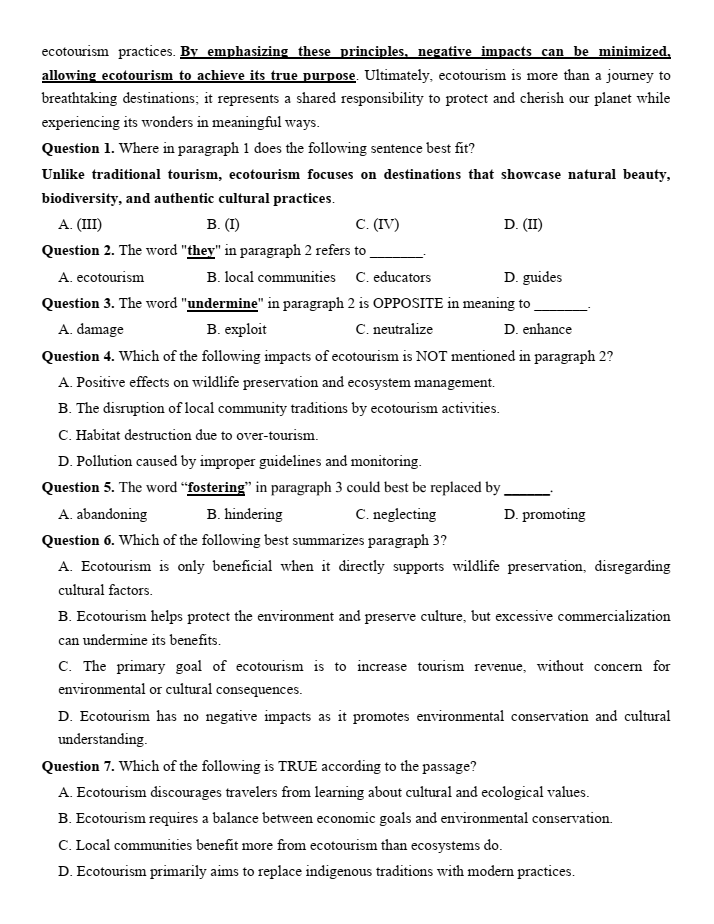
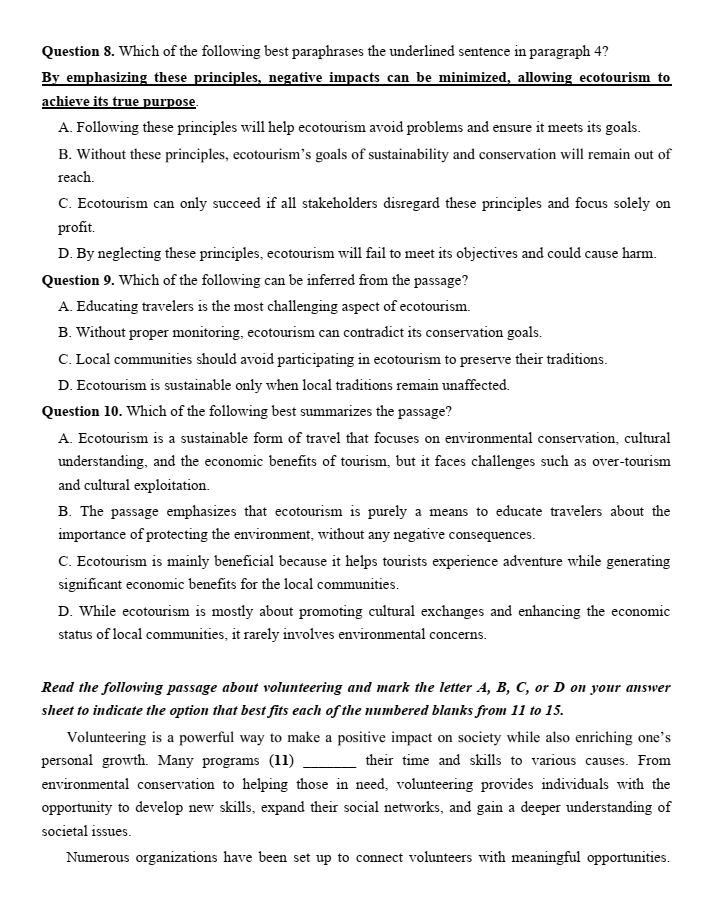
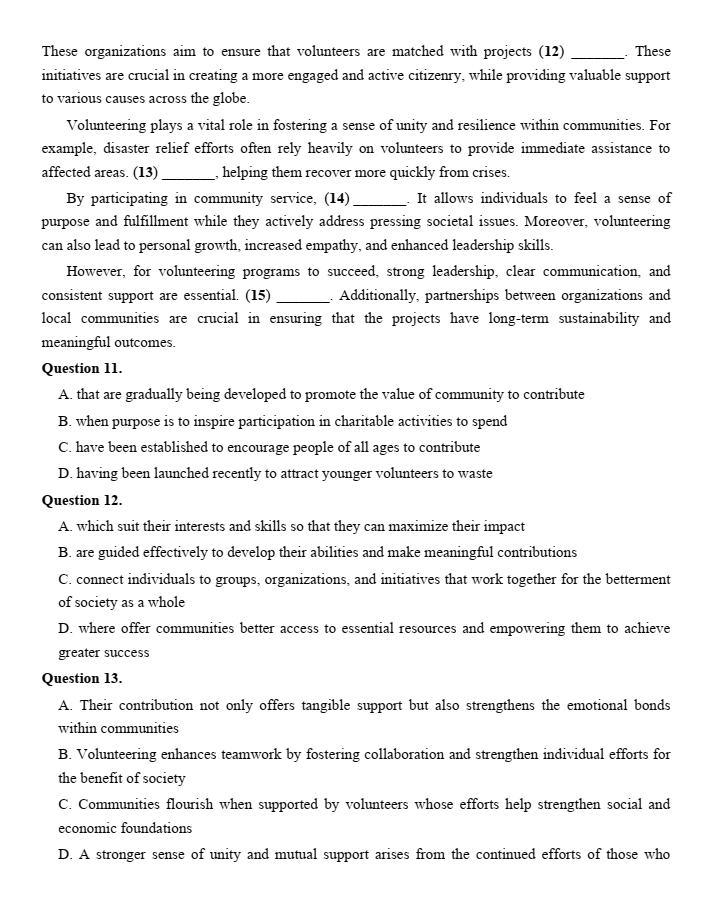
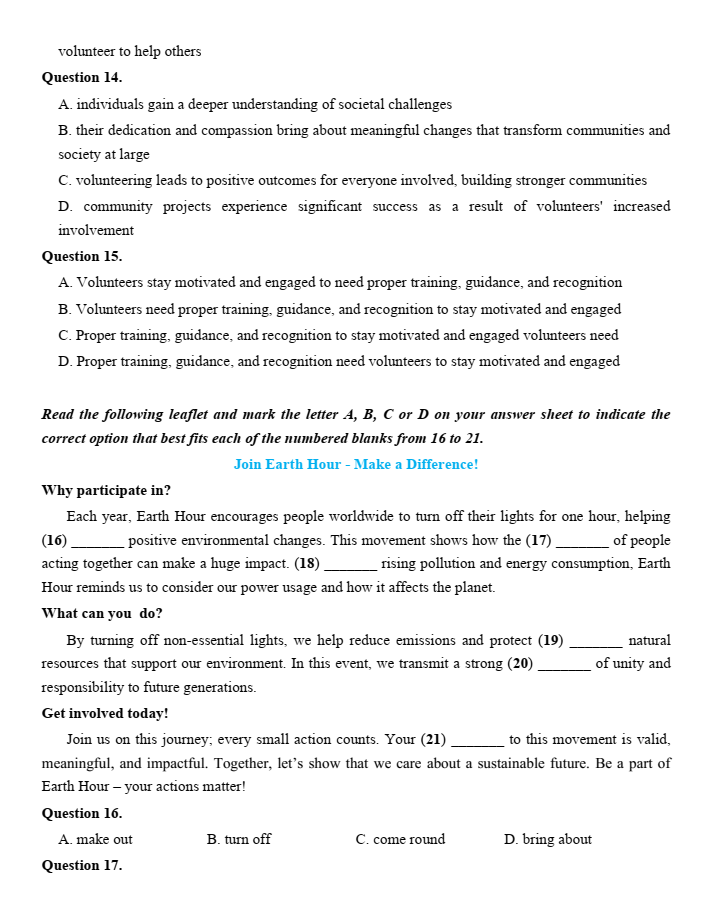
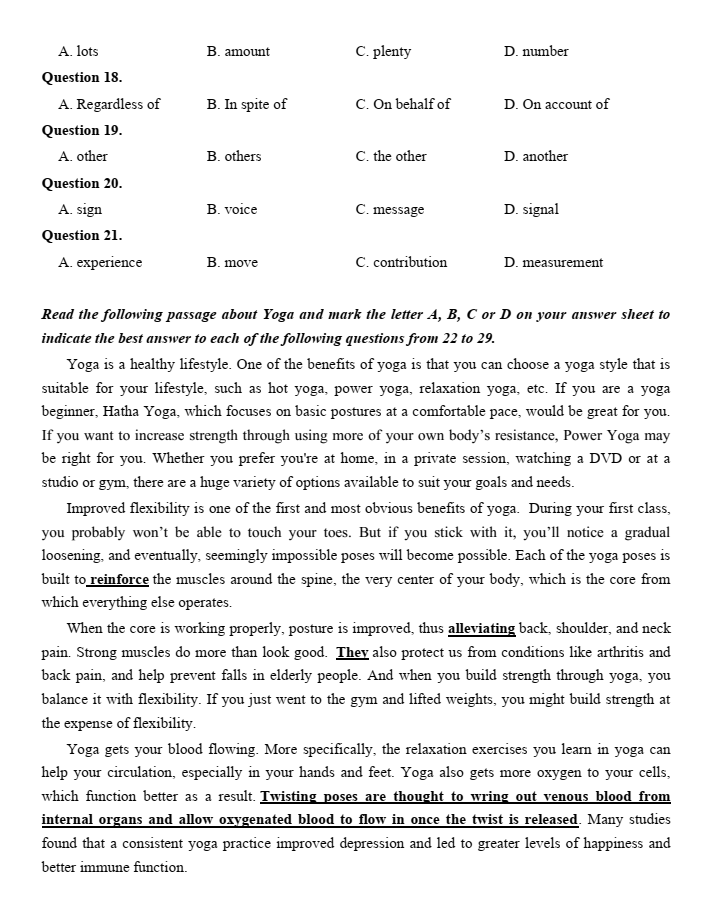
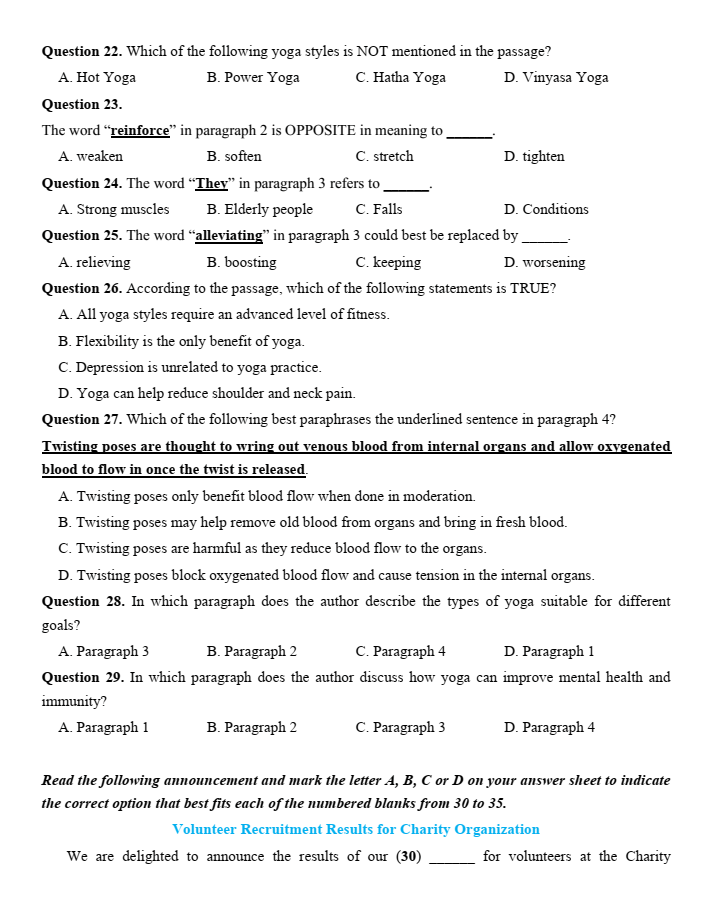
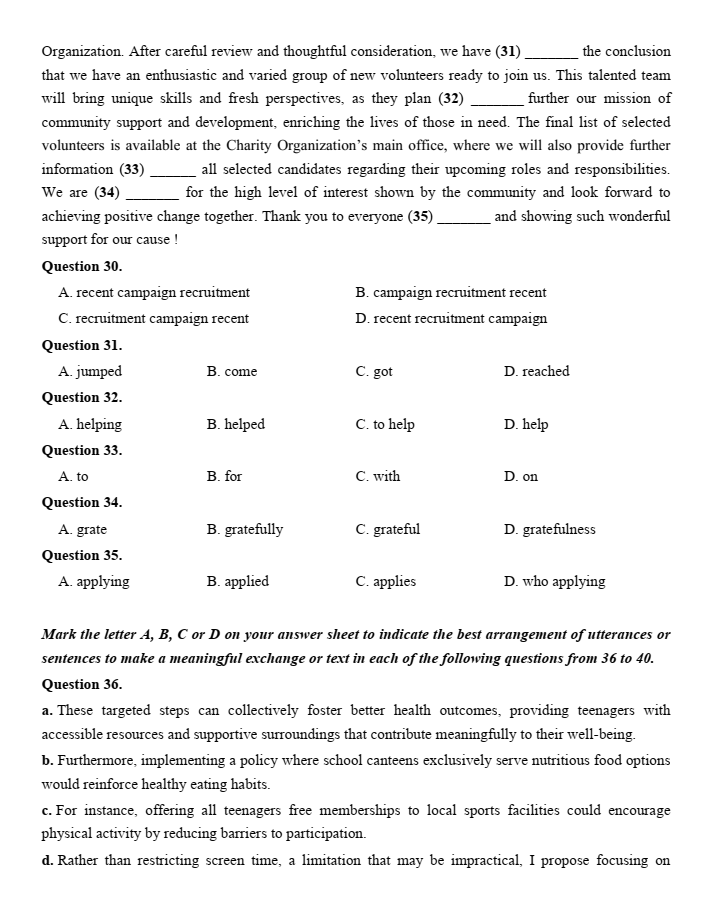
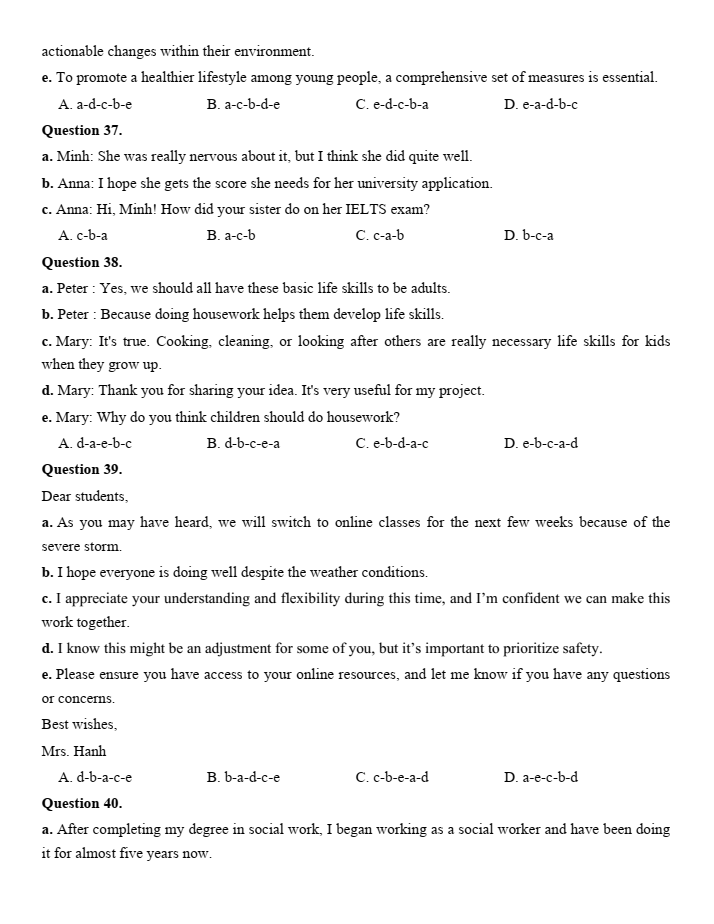
Read the following passage about ecotourism and mark the letter A, B, C, or D on your answer sheet to indicate the best answer to each of the following questions from 1 to 10.
(I) Ecotourism, a form of sustainable travel that prioritizes environmental conservation and cultural awareness, has become increasingly popular over the years as more people seek meaningful travel experiences. (II) Its appeal lies in its dual promise of adventure and responsible travel, making it an attractive option for environmentally conscious travelers. (III) However, it’s not all sunshine and rainbows. While it offers significant benefits, including boosting the local economy and promoting conservation efforts, challenges like mismanagement, cultural exploitation, and the potential for environmental degradation persist, underscoring the complexity of balancing tourism with sustainability. (IV)
One of the primary advantages of ecotourism is its potential to foster environmental conservation. By attracting visitors to protected areas, it generates much-needed funds for wildlife preservation and ecosystem management efforts. Furthermore, local communities often play a crucial role in the success of ecotourism. Acting as guides, educators, and stewards, **they** share their knowledge of local flora and fauna, strengthening the bond between humans and nature. However, without proper guidelines and monitoring systems, over-tourism can occur, leading to unintended consequences such as habitat destruction, pollution, and wildlife disturbances that **undermine** conservation efforts.
Another significant benefit of ecotourism is the opportunity to educate travelers about cultural and ecological **values**. Visitors gain unique insights into indigenous traditions and practices, **fostering** mutual respect and understanding. These cultural exchanges can empower local communities and encourage the preservation of their heritage. However, as the saying goes, “The road to hell is paved with good intentions.” In many cases, excessive commercialization of cultural practices for entertainment purposes risks diluting their authenticity and reducing them to mere performances for tourist consumption. This exploitation not only diminishes the cultural value but also alienates the communities whose heritage is being commercialized.
For ecotourism to truly succeed, all stakeholders – tourists, businesses, and local communities – must strike a delicate balance between profit-making and preservation. Clear policies, robust community involvement, and responsible travel behavior are essential components of sustainable ecotourism practices. **By emphasizing these principles, negative impacts can be minimized, allowing ecotourism to achieve its true purpose.** Ultimately, ecotourism is more than a journey to breathtaking destinations; it represents a shared responsibility to protect and cherish our planet while experiencing its wonders in meaningful ways.
Question 1. Where in paragraph 1 does the following sentence best fit?
Unlike traditional tourism, ecotourism focuses on destinations that showcase natural beauty, biodiversity, and authentic cultural practices.
A. (III)
B. (I)
C. (IV)
D. (II)
Question 2. The word “**they**” in paragraph 2 refers to ______.
A. ecotourism
B. local communities
C. educators
D. guides
Question 3. The word “**undermine**” in paragraph 2 is OPPOSITE in meaning to ______.
A. damage
B. exploit
C. neutralize
D. enhance
Question 4. Which of the following impacts of ecotourism is NOT mentioned in paragraph 2?
A. Positive effects on wildlife preservation and ecosystem management.
B. The disruption of local community traditions by ecotourism activities.
C. Habitat destruction due to over-tourism.
D. Pollution caused by improper guidelines and monitoring.
Question 5. The word “**fostering**” in paragraph 3 could be best replaced by ______.
A. abandoning
B. hindering
C. neglecting
D. promoting
Question 6. Which of the following best summarizes paragraph 3?
A. Ecotourism is only beneficial when it directly supports wildlife preservation, disregarding cultural factors.
B. Ecotourism helps protect the environment and preserve culture, but excessive commercialization can undermine its benefits.
C. The primary goal of ecotourism is to increase tourism revenue, without concern for environmental or cultural consequences.
D. Ecotourism has no negative impacts as it promotes environmental conservation and cultural understanding.
Question 7. Which of the following is TRUE according to the passage?
A. Ecotourism discourages travelers from learning about cultural and ecological values.
B. Ecotourism requires a balance between economic goals and environmental conservation.
C. Local communities benefit more from ecotourism than ecosystems do.
D. Ecotourism primarily aims to replace indigenous traditions with modern practices.
Question 8. Which of the following best paraphrases the underlined sentence in paragraph 4?
By emphasizing these principles, negative impacts can be minimized, allowing ecotourism to achieve its true purpose.
A. Following these principles will help ecotourism avoid problems and ensure it meets its goals.
B. Without these principles, ecotourism’s goals of sustainability and conservation will remain out of reach.
C. Ecotourism can only succeed if all stakeholders disregard these principles and focus solely on profit.
D. By neglecting these principles, ecotourism will fail to meet its objectives and could cause harm.
Question 9. Which of the following can be inferred from the passage?
A. Educating travelers is the most challenging aspect of ecotourism.
B. Without proper monitoring, ecotourism can contradict its conservation goals.
C. Local communities should avoid participating in ecotourism to preserve their traditions.
D. Ecotourism is sustainable only when local traditions remain unaffected.
Question 10. Which of the following best summarizes the passage?
A. Ecotourism is a sustainable form of travel that focuses on environmental conservation, cultural understanding, and the economic benefits of tourism, but it faces challenges such as over-tourism and cultural exploitation.
B. The passage emphasizes that ecotourism is purely a means to educate travelers about the importance of protecting the environment, without any negative consequences.
C. Ecotourism is mainly beneficial because it helps tourists experience adventure while generating significant economic benefits for the local communities.
D. While ecotourism is mostly about promoting cultural exchanges and enhancing the economic status of local communities, it rarely involves environmental concerns.
Read the following passage about volunteering and mark the letter A, B, C, or D on your answer sheet to indicate the option that best fits each of the numbered blanks from 11 to 15.
Volunteering is a powerful way to make a positive impact on society while also enriching one’s personal growth. Many programs (11) ______ their time and skills to various causes. From environmental conservation to helping those in need, volunteering provides individuals with the opportunity to develop new skills, expand their social networks, and gain a deeper understanding of societal issues.
Numerous organizations have been set up to connect volunteers with meaningful opportunities. These organizations aim to ensure that volunteers are matched with projects (12) ______. These initiatives are crucial in creating a more engaged and active citizenry, while providing valuable support to various causes across the globe.
Volunteering plays a vital role in fostering a sense of unity and resilience within communities. For example, disaster relief efforts often rely heavily on volunteers to provide immediate assistance to affected areas, (13) ______ helping them recover more quickly from crises.
By participating in community service, (14) ______. It allows individuals to feel a sense of purpose and fulfillment while they actively address pressing societal issues. Moreover, volunteering can also lead to personal growth, increased empathy, and enhanced leadership skills.
However, for volunteering programs to succeed, strong leadership, clear communication, and consistent support are essential. (15) ______. Additionally, partnerships between organizations and local communities are crucial in ensuring that the projects have long-term sustainability and meaningful outcomes.
Question 11.
A. that are gradually being developed to promote the value of community to contribute
B. when purpose is to inspire participation in charitable activities to spend
C. have been established to encourage people of all ages to contribute
D. having been launched recently to attract younger volunteers to waste
Question 12.
A. which suit their interests and skills so that they can maximize their impact
B. are guided effectively to develop their abilities and make meaningful contributions
C. connect individuals to groups, organizations, and initiatives that work together for the betterment of society as a whole
D. where offer communities better access to essential resources and empowering them to achieve greater success
Question 13.
A. Their contribution not only offers tangible support but also strengthens the emotional bonds within communities
B. Volunteering enhances teamwork by fostering collaboration and strengthen individual efforts for the benefit of society
C. Communities flourish when supported by volunteers whose efforts help strengthen social and economic foundations
D. A stronger sense of unity and mutual support arises from the continued efforts of those who volunteer to help others
Question 14.
A. individuals gain a deeper understanding of societal challenges
B. their dedication and compassion bring about meaningful changes that transform communities and society at large
C. volunteering leads to positive outcomes for everyone involved, building stronger communities
D. community projects experience significant success as a result of volunteers’ increased involvement
Question 15.
A. Volunteers stay motivated and engaged to need proper training, guidance, and recognition
B. Volunteers need proper training, guidance, and recognition to stay motivated and engaged
C. Proper training, guidance, and recognition to stay motivated and engaged volunteers need
D. Proper training, guidance, and recognition need volunteers to stay motivated and engaged
Read the following leaflet and mark the letter A, B, C or D on your answer sheet to indicate the correct option that best fits each of the numbered blanks from 16 to 21.
Join Earth Hour – Make a Difference!
Why participate in?
Each year, Earth Hour encourages people worldwide to turn off their lights for one hour, helping (16)______ positive environmental changes. This movement shows how the (17)______ of people acting together can make a huge impact. (18)______ rising pollution and energy consumption, Earth Hour reminds us to consider our power usage and how it affects the planet.
What can you do?
By turning off non-essential lights, we help reduce emissions and protect (19)______ natural resources that support our environment. In this event, we transmit a strong (20)______ of unity and responsibility to future generations.
Get involved today!
Join us on this journey; every small action counts. Your (21)______ to this movement is valid, meaningful, and impactful. Together, let’s show that we care about a sustainable future. Be a part of Earth Hour – your actions matter!
Question 16.
A. make out
B. turn off
C. come round
D. bring about
Question 17.
A. lots
B. amount
C. plenty
D. number
Question 18.
A. Regardless of
B. In spite of
C. On behalf of
D. On account of
Question 19.
A. other
B. others
C. the other
D. another
Question 20.
A. sign
B. voice
C. message
D. signal
Question 21.
A. experience
B. move
C. contribution
D. measurement
Read the following passage about Yoga and mark the letter A, B, C or D on your answer sheet to indicate the best answer to each of the following questions from 22 to 29.
Yoga is a healthy lifestyle. One of the benefits of yoga is that you can choose a yoga style that is suitable for your lifestyle, such as hot yoga, power yoga, relaxation yoga, etc. If you are a yoga beginner, Hatha Yoga, which focuses on basic postures at a comfortable pace, would be great for you. If you want to increase strength through using more of your own body’s resistance, Power Yoga may be right for you. Whether you prefer you’re at home, in a private session, watching a DVD or at a studio or gym, there are a huge variety of options available to suit your goals and needs.
Improved flexibility is one of the first and most obvious benefits of yoga. During your first class, you probably won’t be able to touch your toes. But if you stick with it, you’ll notice a gradual loosening, and eventually, seemingly impossible poses will become possible. Each of the yoga poses is built to **reinforce** the muscles around the spine, the very center of your body, which is the core from which everything else operates.
When the core is working properly, posture is improved, thus **alleviating** back, shoulder, and neck pain. Strong muscles do more than look good. **They** also protect us from conditions like arthritis and back pain, and help prevent falls in elderly people. And when you build strength through yoga, you balance it with flexibility. If you just went to the gym and lifted weights, you might build strength at the expense of flexibility.
Yoga gets your blood flowing. More specifically, the relaxation exercises you learn in yoga can help your circulation, especially in your hands and feet. Yoga also gets more oxygen to your cells, which function better as a result. **Twisting poses are thought to wring out venous blood from internal organs and allow oxygenated blood to flow in once the twist is released.** Many studies found that a consistent yoga practice improved depression and led to greater levels of happiness and better immune function.
Question 22. Which of the following yoga styles is NOT mentioned in the passage?
A. Hot Yoga
B. Power Yoga
C. Hatha Yoga
D. Vinyasa Yoga
Question 23. The word “**reinforce**” in paragraph 2 is OPPOSITE in meaning to ______.
A. weaken
B. soften
C. stretch
D. tighten
Question 24. The word “**They**” in paragraph 3 refers to ______.
A. Strong muscles
B. Elderly people
C. Falls
D. Conditions
Question 25. The word “**alleviating**” in paragraph 3 could best be replaced by ______.
A. relieving
B. boosting
C. keeping
D. worsening
Question 26. According to the passage, which of the following statements is TRUE?
A. All yoga styles require an advanced level of fitness.
B. Flexibility is the only benefit of yoga.
C. Depression is unrelated to yoga practice.
D. Yoga can help reduce shoulder and neck pain.
Question 27. Which of the following best paraphrases the underlined sentence in paragraph 4?
Twisting poses are thought to wring out venous blood from internal organs and allow oxygenated blood to flow in once the twist is released.
A. Twisting poses only benefit blood flow when done in moderation.
B. Twisting poses may help remove old blood from organs and bring in fresh blood.
C. Twisting poses are harmful as they reduce blood flow to the organs.
D. Twisting poses block oxygenated blood flow and cause tension in the internal organs.
Question 28. In which paragraph does the author describe the types of yoga suitable for different goals?
A. Paragraph 3
B. Paragraph 2
C. Paragraph 4
D. Paragraph 1
Question 29. In which paragraph does the author discuss how yoga can improve mental health and immunity?
A. Paragraph 1
B. Paragraph 2
C. Paragraph 3
D. Paragraph 4
Read the following announcement and mark the letter A, B, C or D on your answer sheet to indicate the correct option that best fits each of the numbered blanks from 30 to 35.
Volunteer Recruitment Results for Charity Organization
We are delighted to announce the results of our (30) ______ for volunteers at the Charity Organization. After careful review and thoughtful consideration, we have (31) ______ the conclusion that we have an enthusiastic and varied group of new volunteers ready to join us. This talented team will bring unique skills and fresh perspectives, as they plan (32) ______ further our mission of community support and development, enriching the lives of those in need. The final list of selected volunteers is available at the Charity Organization’s main office, where we will also provide further information (33) ______ all selected candidates regarding their upcoming roles and responsibilities. We are (34) ______ for the high level of interest shown by the community and look forward to achieving positive change together. Thank you to everyone (35) ______ and showing such wonderful support for our cause !
Question 30.
A. recent campaign recruitment
B. campaign recruitment recent
C. recruitment campaign recent
D. recent recruitment campaign
Question 31.
A. jumped
B. come
C. got
D. reached
Question 32.
A. helping
B. helped
C. to help
D. help
Question 33.
A. to
B. for
C. with
D. on
Question 34.
A. grate
B. gratefully
C. grateful
D. gratefulness
Question 35.
A. applying
B. applied
C. applies
D. who applying
Mark the letter A, B, C or D on your answer sheet to indicate the best arrangement of utterances or sentences to make a meaningful exchange or text in each of the following questions from 36 to 40.
Question 36.
a. These targeted steps can collectively foster better health outcomes, providing teenagers with accessible resources and supportive surroundings that contribute meaningfully to their well-being.
b. Furthermore, implementing a policy where school canteens exclusively serve nutritious food options would reinforce healthy eating habits.
c. For instance, offering all teenagers free memberships to local sports facilities could encourage physical activity by reducing barriers to participation.
d. Rather than restricting screen time, a limitation that may be impractical, I propose focusing on actionable changes within their environment.
e. To promote a healthier lifestyle among young people, a comprehensive set of measures is essential.
A. a-d-c-b-e
B. a-c-b-d-e
C. e-d-c-b-a
D. e-a-d-b-c
Question 37.
a. Minh: She was really nervous about it, but I think she did quite well.
b. Anna: I hope she gets the score she needs for her university application.
c. Anna: Hi, Minh! How did your sister do on her IELTS exam?
A. c-b-a
B. a-c-b
C. c-a-b
D. b-c-a
Question 38.
a. Peter : Yes, we should all have these basic life skills to be adults.
b. Peter : Because doing housework helps them develop life skills.
c. Mary: It’s true. Cooking, cleaning, or looking after others are really necessary life skills for kids when they grow up.
d. Mary: Thank you for sharing your idea. It’s very useful for my project.
e. Mary: Why do you think children should do housework?
A. d-a-e-b-c
B. d-b-c-e-a
C. e-b-d-a-c
D. e-b-c-a-d
Question 39.
Dear students,
a. As you may have heard, we will switch to online classes for the next few weeks because of the severe storm.
b. I hope everyone is doing well despite the weather conditions.
c. I appreciate your understanding and flexibility during this time, and I’m confident we can make this work together.
d. I know this might be an adjustment for some of you, but it’s important to prioritize safety.
e. Please ensure you have access to your online resources, and let me know if you have any questions or concerns.
Best wishes,
Mrs. Hanh
A. d-b-a-c-e
B. b-a-d-c-e
C. c-b-e-a-d
D. a-e-c-b-d
Question 40.
a. After completing my degree in social work, I began working as a social worker and have been doing it for almost five years now.
b. In short, my advice to anyone who is considering a career in social work is to have a strong support system in place and take care of yourself mentally and physically.
c. It can be emotionally challenging at times, but the reward of seeing people’s lives change for the better is what keeps me motivated to work hard every day.
d. I have always been passionate about helping others in my community.
e. I always try to make a positive difference in someone’s life, no matter how small it may be. Knowing that I am able to make a positive impact on someone’s life makes me feel good.
A. e-c-d-a-b
B. d-a-c-e-b
C. c-a-d-e-b
D. a-e-c-d-b
Mục đích tổ chức kỳ thi Đại học năm 2025 là gì?
Căn cứ theo quy chế hiện hành của Bộ Giáo dục và Đào tạo và các văn bản hướng dẫn tổ chức kỳ thi Đại học năm 2025, mục đích của kỳ thi là:
– Đánh giá kết quả học tập của học sinh sau 12 năm học theo yêu cầu của chương trình giáo dục phổ thông.
– Lấy kết quả thi để xét công nhận tốt nghiệp trung học phổ thông và làm căn cứ tuyển sinh đại học, cao đẳng.
– Góp phần đánh giá chất lượng giáo dục của địa phương và cả nước, làm cơ sở điều chỉnh nội dung, phương pháp dạy học trong nhà trường.
Thí sinh thi Đại học năm 2025 có bắt buộc thi môn Tiếng Anh không?
Theo quy định hiện hành của Bộ Giáo dục và Đào tạo và hướng dẫn tổ chức kỳ thi tốt nghiệp Đại học năm 2025, thí sinh dự thi phải thực hiện như sau:
– Thi 3 môn bắt buộc: Toán, Ngữ văn và Ngoại ngữ.
– Ngoài ra, thí sinh phải chọn một trong hai bài thi tổ hợp: Khoa học Tự nhiên (gồm các môn Vật lí, Hóa học, Sinh học) hoặc Khoa học Xã hội (gồm các môn Lịch sử, Địa lí, Giáo dục công dân – dành cho học sinh học chương trình giáo dục phổ thông).
Trong số các môn thi, Tiếng Anh là một trong ba môn thuộc bài thi Ngoại ngữ bắt buộc, thí sinh phải thi môn Tiếng Anh như một môn bắt buộc, không phụ thuộc vào lựa chọn bài thi tổ hợp hay mục đích xét tuyển đại học.
Như vậy, kỳ thi Đại học năm 2025 bắt buộc thí sinh phải thi môn Tiếng Anh.

